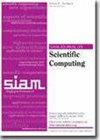应用于三维亥姆霍兹问题的 HPS 离散化迭代求解器
IF 2.6
2区 数学
Q1 MATHEMATICS, APPLIED
引用次数: 0
摘要
SIAM 科学计算期刊》,第 46 卷第 1 期,第 A80-A104 页,2024 年 2 月。 摘要本手稿针对三维变系数亥姆霍兹(Helmholtz)问题的分层普恩卡雷-斯特克洛夫(HPS)离散化所产生的线性系统提出了一种高效求解器。以往关于 HPS 方法的研究将其与直接求解器联系在一起。这项工作是首个针对 HPS 离散化产生的线性系统的高效迭代求解器。该求解技术利用 GMRES 与局部均质化块-Jacobi 前置条件器相结合。离散化和预处理的局部性自然产生了线性系统的无矩阵应用。数值结果表明了该求解技术的性能。其中包括一项实验,在该实验中,一个每个方向约 100 个波长的问题需要超过 10 亿个未知数才能达到约 4 位数的精度,而求解时间不到 20 分钟。本文章由计算机程序翻译,如有差异,请以英文原文为准。
An Iterative Solver for the HPS Discretization Applied to Three Dimensional Helmholtz Problems
SIAM Journal on Scientific Computing, Volume 46, Issue 1, Page A80-A104, February 2024.
Abstract. This manuscript presents an efficient solver for the linear system that arises from the hierarchical Poincaré–Steklov (HPS) discretization of three dimensional variable coefficient Helmholtz problems. Previous work on the HPS method has tied it with a direct solver. This work is the first efficient iterative solver for the linear system that results from the HPS discretization. The solution technique utilizes GMRES coupled with a locally homogenized block-Jacobi preconditioner. The local nature of the discretization and preconditioner naturally yield the matrix-free application of the linear system. Numerical results illustrate the performance of the solution technique. This includes an experiment where a problem approximately 100 wavelengths in each direction that requires more than a billion unknowns to achieve approximately 4 digits of accuracy takes less than 20 minutes to solve.
Abstract. This manuscript presents an efficient solver for the linear system that arises from the hierarchical Poincaré–Steklov (HPS) discretization of three dimensional variable coefficient Helmholtz problems. Previous work on the HPS method has tied it with a direct solver. This work is the first efficient iterative solver for the linear system that results from the HPS discretization. The solution technique utilizes GMRES coupled with a locally homogenized block-Jacobi preconditioner. The local nature of the discretization and preconditioner naturally yield the matrix-free application of the linear system. Numerical results illustrate the performance of the solution technique. This includes an experiment where a problem approximately 100 wavelengths in each direction that requires more than a billion unknowns to achieve approximately 4 digits of accuracy takes less than 20 minutes to solve.
求助全文
通过发布文献求助,成功后即可免费获取论文全文。
去求助
来源期刊
CiteScore
5.50
自引率
3.20%
发文量
209
审稿时长
1 months
期刊介绍:
The purpose of SIAM Journal on Scientific Computing (SISC) is to advance computational methods for solving scientific and engineering problems.
SISC papers are classified into three categories:
1. Methods and Algorithms for Scientific Computing: Papers in this category may include theoretical analysis, provided that the relevance to applications in science and engineering is demonstrated. They should contain meaningful computational results and theoretical results or strong heuristics supporting the performance of new algorithms.
2. Computational Methods in Science and Engineering: Papers in this section will typically describe novel methodologies for solving a specific problem in computational science or engineering. They should contain enough information about the application to orient other computational scientists but should omit details of interest mainly to the applications specialist.
3. Software and High-Performance Computing: Papers in this category should concern the novel design and development of computational methods and high-quality software, parallel algorithms, high-performance computing issues, new architectures, data analysis, or visualization. The primary focus should be on computational methods that have potentially large impact for an important class of scientific or engineering problems.

 求助内容:
求助内容: 应助结果提醒方式:
应助结果提醒方式:


